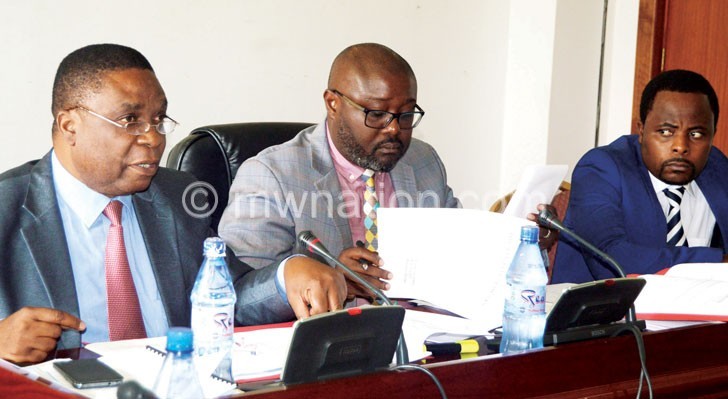Interest capping bill resurfaces
Parliament is set to get a report on the controversial Financial Services Act (Amendment) Bill after its joint committee concluded local and international consultations.
In November 2018, Dowa West member of Parliament (MP) Alexander Kusamba Dzonzi (Malawi Congress Party-MCP) introduced the contentious Bill which proposes a regulatory measure to prevents banks and financial institutions from charging more than a certain level of interest. The House referred the Bill to a committee for further scrutiny.

Members of the three committees of Parliament comprising Public Accounts, Women’s Caucus and Government Assurances formed a Joint Committee mandated, after the first reading of the Bill, to undertake evidence-based research and study on the implications.
Proponents of the Bill argue that the current lending rate system favours the country’s lenders while opponents counterargue that capping the interest rate would affect the national economy as banks are likely to collapse.
Joint Committee chairperson Alekeni Menyani confirmed making consultations both on the local and international scenes on the interest capping bill as mandated by Parliament. He said they are working against time because the report is expected to be presented in Parliament this week.
He said: “There is an evidence-based study report being finalised that looked at Kenya, Zambia and Ghana being some of the jurisdictions where they have tried capping in Africa.”
Menyani said the committee also consulted Human Rights Defenders Coalition (HRDC), the Reserve Bank of Malawi (RBM), Malawi Union of Savings and Credit Cooperatives (Muscco), microfinance network, Bankers Association of Malawi (BAM), academics and borrowers.
“Treasury shunned our calls for consultation,” he said.
In a separate interview, Kusamba Dzonzi said the consultations have reaffirmed his position, saying all stakeholders, including Minister of Finance Goodall Gondwe, RBM Governor Dalitso Kabambe and BAM as well as Indigenous Businesses Association of Malawi (Ibam) officials have agreed with him that the interest rates in Malawi are above the reach of the common man; hence, they cannot spur economic growth in their current state.
“I believe that the solution to reducing these rates lies in capping,” he said.
In an earlier interview, BAM warned of far-reaching consequences to the economy once interest rates are capped through the Financial Services Act (Amendment) Bill.
BAM president Paul Guta also told the joint parliamentary committee that the country will face economic shocks when interest rates are capped.
Malawi Confederation of Chambers of Commerce and Industry (MCCCI) chief executive officer Chancellor Kaferapanjira is on record as having said that if passed into law, interest rate capping will not support small businesses because they exhibit slightly higher risks.
While acknowledging that high cost of finance remains an obstacle to doing business in Malawi, he said capping interest rate was not the best mechanism to address the challenge.
Said Kaferapanjira: “We think that interest rates should indeed go down, but putting it in a law means that we are putting up a permanent structure and the law will be very difficult to change.”
In January this year, RBM slashed the policy rate to 14.5 percent from 16 percent.
Last week, UTM Party urged Parliament not to pass the proposed Bill, saying the Registrar of Financial Institutions (the RBM Governor) should instead regulate the market.
In a statement signed by UTM Party president Saulos Chilima, who is also the country’s Vice-President, the party said Parliament should see to it that the Registrar of Financial Institutions ensures accountability for the persistent challenges relating to the cost of capital in the country.
But Menyani said UTM’s statement was undermining Parliament which was trying to help the common man.
Financial market analyst Anthony Mukumbwa said capping of the lending interest rates, including treasury bills and bonds, is necessary to avoid crowding out the private sector.
On UTM position, he observed that lobbying Parliament not to pass the Bill was against the advice by a competent court and other stakeholders.
Said Mukumbwa: “Surely, it would be naive and irresponsible to think the same registrars who have failed to protect people against ‘predatory’ financial institutions will this time act just because some political party in the name of UTM has said so.”
The Malawi Government stated that it is not in favour of the Bill. n





